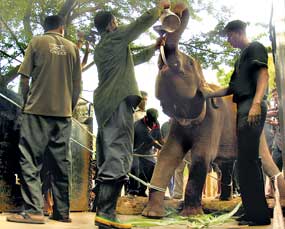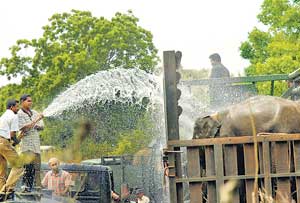Atlas was playfully waving his trunk, minding his own business last Saturday morning at the Uda Walawe Eth Athuru Sevana Elephant Transit Home (ETH), ignoring the unusually large gathering of humans around him and blissfully unaware of the purpose of the green truck parked a few feet away from his little space.
The other baby elephants at the ETH, his friends, his only family, took no notice when a man approached Atlas with his morning milk. Atlas eagerly lifted his trunk to gulp down his favourite liquid. After all, the man was no stranger. He had fed him almost all his life.
 |
| It’s milk all the way upto the truck. |
But he was only allowed a couple of sips. The man retreated, with his jar, tube, milk and all. He held the jar high again, beckoning the baby elephant to come forward. “Come and get it,” the look in his eyes seemed to suggest, and the other humans, too, encouraged Atlas to do just that.
Now Atlas decided he had enough to drink. So, apparently, did the men.
It all happened in quick succession. First the men started pushing the unsuspecting four-and-a-half year-old elephant into the truck and then tied ropes to his legs, pulling from inside the truck. The elephant trumpeted its protest but the mahouts didn’t seem to care.
They pulled and pushed as hard as they could trying to get Atlas inside the truck.
Less than 20 minutes later, Atlas was inside with several other baby elephants, locked up and scared.
But what came next was something so valuable, something that every living being craves for – freedom.
What seemed like an inhuman capture of an innocent baby elephant was actually an attempt to give it what it needed, to live among its own kind in its own natural habitat. The pushing, the pulling and the ropes were for the greater good. Atlas and his friends would thank the humans one day.
They were among the eight baby elephants released back into the wild, by the Uda Walawe Eth Athuru Sevana Elephant Transit Home run by the Wild Life Department on Saturday, June 14.
Located at the south-western corner of the Uda Walawe Reservoir, the Eth Athuru Sevana (ETH) was established as far back as 1995 as a part of the Uda Walawe National Park with the objective of rehabilitating orphaned elephants, and taking them back to the wild.
The young elephants were transported by truck to a location deep inside the park where they were blessed by Buddhist monks and then washed with dung mixed water and set free. “It is necessary to give them a dung bath to wash away the human scent on them. Or else the other wild elephants won’t accept the newcomers,” explained Dr. Tharaka Prasad, acting deputy director of the ETH, Wildlife Health Management Centre.
 |
| Time for dung bath to wash away human scent |
The Eth Athuru Sevana ETH is not your typical elephant orphanage. For instance, it couldn’t be more different from the better known Pinnawala Elephant Orphanage. “At Pinnawala the elephants have limited freedom. We thought about this and came up with the concept of the ETH. The idea was formulated by Dr. N. Atapattu and his colleagues. At the ETH we raise elephants in semi wild conditions and release them when the time comes,” says Dr. Suhada Jayawardane, ETH Veterinary Surgeon .
The eight elephants released are fixed with radio collars which would transmit a pulse to help locate their wearers’ position. It is also equipped with a mortality sensor and this apparatus is used to check on the progress of the elephants that now have to fend for themselves in the unforgiving wilderness.
“One collar costs a hundred thousand rupees,” says Dr. Prasad.
Looking after the jumbos is costly too. According to Dr. Prasad the milk alone costs Rs. 900, 000 a year (the milk used is a low fat, high protein form of lac formula 2). The government grants Rs. 6.1 million rupees annually to the ETH for its work.But the home is in desperate need of more funds and to meet this end, the ETH has come up with the concept of foster parenting where individuals and organisations can “adopt” a baby elephant and pay for its care.
“We need more money to run this place. We request a monthly contribution of Rs. 25, 000 from foster parents,” says Dr. Prasad.
Dr. Gilbert Silva and his wife Mala Silva, both elephant lovers have adopted a baby elephant by the name of Shara. The two-and-a-half year-old is named after the couple’s granddaughter Sharaliya.
“She was originally called Thiripane Aliya; she had met with an accident when she was found by the army. We come here every two months to see her. She has diarrhoea. The doctors say she has a virus infection. She’s probably the weakest of the lot. I hope she’ll be OK or we’ll all be heartbroken,” says Mrs. Silva.
ETH hopes to release Shara in another two years. “We’ll miss her. I was in tears when I met her,” Mrs. Silva adds. | 

